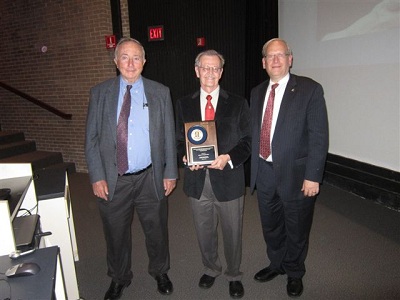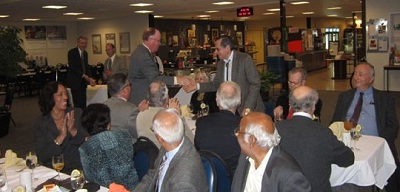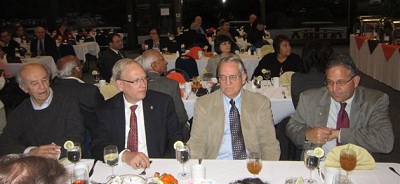Personal
Laying the Foundation for the next stage of Quality
In October, Dr. Westgard received the 2012 Van Slyke Award from the New York - Metro Section of the AACC. A few comments on the ceremony and the efforts of the New York chapter.
Remarks at the Van Slyke Award
October 2012
Recently the American Association for Clinical Chemistry, New York - Metropolitan section, gave the 2012 Van Slyke award to Dr. James O. Westgard, PhD. The New York-Metro section recognized Dr. Westgard for his "contributions his research made to the science of quality control in laboratory medicine."

Dr. Arthur Karmen, Dr. Westgard, and Dr. Ellis Jacobs
For those unfamiliar with Dr. Donald Van Slyke, we quote from his biography listed on the AACC website:
"Dr. Van Slyke was also a great teacher and leader in his field. A constant stream of scientists from all over the world came to his laboratory for training earning Dr. Van Slyke the nickname of "The Chief". Almost 400 papers, books and monographs, numerous lectures and the record of performance of the more than 100 workers who have been trained with him, attest to his eminence as an educator and mentor."
The evening included not only lectures and the award ceremony, but a dinner as well. Picture here are (from left to right) Dr. Laszlo Sarkoszi, Dr Jacobs, Dr. Carl Garber.
Dr. Van Slyke helped to create the modern foundation for clinical chemistry. He did this in a time of rapid change, expanding demand for testing, newly emerging science and new testing technologies, when laboratory professionals were struggling to keep up with all of these trends.
In other words, the time back then is a lot like the new era we face now. There is still a growing demand for tests, an explosion of the kinds of testing that can be done, and a real crisis in trying to manage the growth while constraining the costs.
How laboratories will succeed in today's enviroment is by learning what parts of the "foundation" are still rock solid and relevant, and what parts need to evolve and change with the times. We won't be able to create the new laboratory of the future from whole cloth, by abandoning all the teachings and wisdom of the first 50 years of laboratory medicine. Success will only happen when we bring the best of the "old" and integrate it with the "new." And along the way, we might find that many of these new challenges are quite similar to the ones that our previous generations of lab people faced before.
Here's just a short excerpt from the abstract and lecture:
"Many tools and techniques exist that can help laboratories manage analytical quality in an objective and quantitative way. In this age of risk management, laboratories should be careful to integrate the new risk analysis tools with existing error management tools. Method validation is still a critical process for managing analytical quality. Statistical QC is still essential to have an independent control mechanism that can be designed to detect medically important errors....
"The risk management approach basically assumes that the existence of a control means that the control will work, without the need to define what quality is required for a test or to validate the detection capabilities of the control. Manufacturers are expected to carry out appropriate studies to validate the performance of the controls that are built in to their analytic systems, but that information may not be available to the laboratory. That lack of transparency may be a major limitation in initial efforts to develop effective laboratory QC Plans."

Siemens Diagnostics graciously provided the location for the evening. Here Dr. Jack Levine is making a few comments. Jack is a good friend and was "present at the conception" of the multirule procedure, what became known as the "Westgard Rules." He was instrumental in helping to popularize the concept of multirule QC among laboratories and manufacturers of diagnostic instruments.
Again, it was my pleasure to be among the luminaries who have received this award. A wonderful honor to receive this award.
Thanks again to the New York - Metro section of the AACC for this award.

